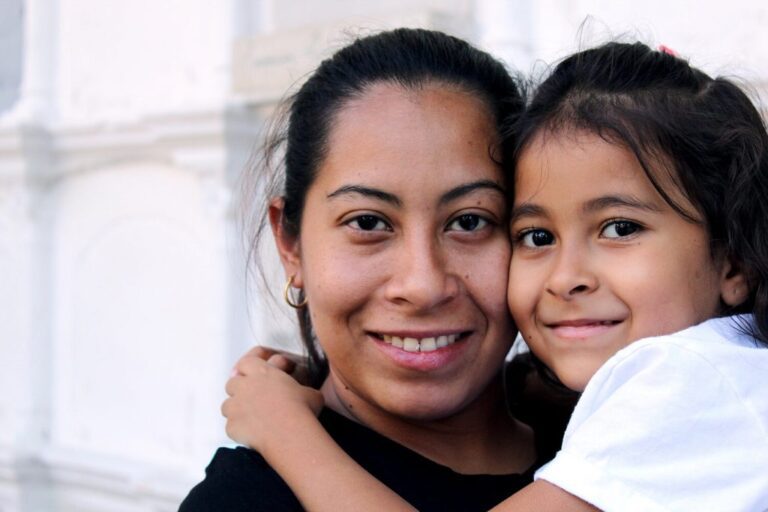Signals of Support Make a Difference for Parents on Campus
This blog is adapted from Amber Angel’s remarks on January 25 at the Aspen Forum on Children and Families, which brought together policymakers, parents, practitioners, researchers, and philanthropists to lift up a set of solid ideas for investing in the economic stability and educational success of children and families.
Like most parents, I just want what’s best for my children. When my oldest daughter Lennon was two and a half years old, I was working at Baby Gap just so I could get the great 50 percent discount on the clothes. But I realized that I wanted more for her and for myself. So, one day, when I was off from work, I took my daughter with me to go look for schools. I went to this for profit college that I heard about on TV that offered a certificate in just six months, and that really appealed to me because it was quick. But they didn't really offer any support for my daughter or me, and it was really expensive. I thought at the time, “There’s got to be something better out there for me.”
Feeling discouraged on my way home, I happened to drive past LA Valley College. Just as I passed a long wall near the entrance, I noticed a swing set peeking over the top. I drove into the parking lot of the child development center, where I learned that they accepted kids of student parents for full day preschool at 2 ½ years old, and fully potty-trained. The semester started in just two weeks. My daughter had just turned 2 ½, but she was not potty-trained. So I went home, made a potty chart, got some skittles and we focused on getting potty-trained. Two weeks later, we started school on the same day together.
At the time I didn’t realize how fortunate I was to be at a campus that offered on-campus child care. Fifty percent of colleges don’t provide this service to students on campus. In a recent conversation with my professor and mentor, Marni Roosevelt, she said to me, “(Amber), you're pretty resilient. I think you would have went out into the community and you would have found resources and you would have found a Head Start or you would have still come to school.”
At first, I somewhat agreed with her, but as I thought about it more, I realized that I don’t think I would have still come to school. It wasn't until I started getting an education, until I started seeing resources on campus, that I would have had that resilience to go out there and find it myself, or even to know that they existed.
Even once I started school, it wasn’t until after I had my second child that I found out about the full set of services that the on-campus Family Resource Center offered. I remember being in math class, surrounded by mostly 18 year olds right out of high school, running back and forth to the bathroom to pump, feeling extremely isolated. My professor Marni Roosevelt, who knew I had just returned from having a baby, told me about the Family Resource Center (FRC) and the lactation room located there. It completely changed everything for me and saved me when I didn't know if I was going to finish that semester, because I felt so alone. Once I began going to the FRC to pump and store my milk, I started bringing my daughter to the play groups and I met other student parents, I gained a mentor, and started to feel a real sense of community that helped me feel like I could really finish. We studied together and used the computer lab. That social capital and really feeling a sense of support is 100 percent life-changing for student parents.
So Lennon and I ended up graduating the same day. And then the next year I started at the university to work on my bachelor’s degree, and she started kindergarten.




Amber Angel pictured above with daughters Everly (L) and Lennon (R).
There are so many capable people out there that would love to go to school if they knew what resources a lot of community colleges offer – especially someone that doesn't have a point of reference like a parent or a sibling to encourage them to go to school like myself and many other first generation students. In my work now with the Family Resource Center, many parenting students who come to us are still in the dark about what’s available to them. Over 30 percent of students attending college are raising children, then why did I feel like I was the only one? There was no box for me to check when I applied to school that asked if I was a student parent, creating these gaps in service that don’t reflect the barriers I faced as a new mom compared to other students.
Sometimes student parents are so overwhelmed that they don't even know what question to ask or what help they need. Having a support system, resources, and personal coaching can make a huge difference – someone there who says: “Let's sit down and figure this out together,” versus, “hey, go to this next office and they'll give you another pamphlet on what you should do.” It’s very difficult for parents to navigate these fragmented and silo-ed services with the limited time they have.
There’s a real need for on campus child care and on campus resource centers for families with children of all ages. Infant care and quality child care are extremely important, but lacking across campuses and even in communities. Long wait lists and the process of finding child care outside of campus, it's daunting for a lot of parents. Communities and colleges need to talk to each other better, and partner together so that there’s more cohesion between services.
Whether it’s a swing set or a lactation room, those signals of support can make all the difference for parents in starting or staying in college. I know it made the difference for me.
Related Posts





